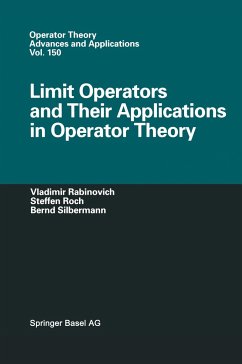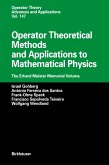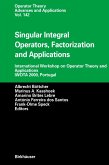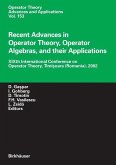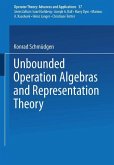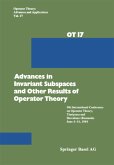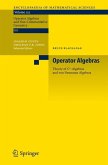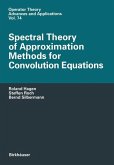The book is devoted to a fairly wide class of operators, namely band and band-dominated operators and their Fredholm theory. The main tool in studying this topic is limit operators. Applications are presented to several important classes of such operators: convolution type operators and pseudo-differential operators on bad domains and with bad coefficients.
This text has two goals. It describes a topic: band and band-dominated operators and their Fredholm theory, and it introduces a method to study this topic: limit operators. Band-dominated operators. Let H = [2(Z) be the Hilbert space of all squared summable functions x : Z -+ Xi provided with the norm 2 2 X IIxl1 :=L I iI . iEZ It is often convenient to think of the elements x of [2(Z) as two-sided infinite sequences (Xi)iEZ. The standard basis of [2(Z) is the family of sequences (ei)iEZ where ei = (. . . ,0,0, 1,0,0, . . . ) with the 1 standing at the ith place. Every bounded linear operator A on H can be described by a two-sided infinite matrix (aij)i,jEZ with respect to this basis, where aij = (Aej, ei)' The band operators on H are just the operators with a matrix representation of finite band-width, i. e. , the operators for which aij = 0 whenever Ii - jl > k for some k. Operators which are in the norm closure ofthe algebra of all band operators are called band-dominated. Needless to say that band and band dominated operators appear in numerous branches of mathematics. Archetypal examples come from discretizations of partial differential operators. It is easy to check that every band operator can be uniquely written as a finite sum L dkVk where the d are multiplication operators (i. e.
This text has two goals. It describes a topic: band and band-dominated operators and their Fredholm theory, and it introduces a method to study this topic: limit operators. Band-dominated operators. Let H = [2(Z) be the Hilbert space of all squared summable functions x : Z -+ Xi provided with the norm 2 2 X IIxl1 :=L I iI . iEZ It is often convenient to think of the elements x of [2(Z) as two-sided infinite sequences (Xi)iEZ. The standard basis of [2(Z) is the family of sequences (ei)iEZ where ei = (. . . ,0,0, 1,0,0, . . . ) with the 1 standing at the ith place. Every bounded linear operator A on H can be described by a two-sided infinite matrix (aij)i,jEZ with respect to this basis, where aij = (Aej, ei)' The band operators on H are just the operators with a matrix representation of finite band-width, i. e. , the operators for which aij = 0 whenever Ii - jl > k for some k. Operators which are in the norm closure ofthe algebra of all band operators are called band-dominated. Needless to say that band and band dominated operators appear in numerous branches of mathematics. Archetypal examples come from discretizations of partial differential operators. It is easy to check that every band operator can be uniquely written as a finite sum L dkVk where the d are multiplication operators (i. e.

